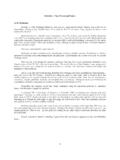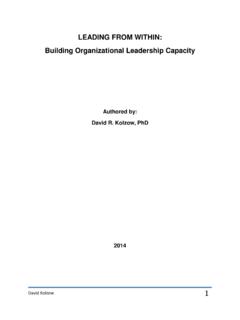Transcription of The 7 Habits of Highly Effective People - William & Mary
1 The 7 Habits of Highly Effective People Kun Sun College of William and Mary 02/22/2016. 1. About the Book By Stephen R. Covey Published in 1989. Interviewed the CEOs of Fortune 500s Top Companies 246 Weeks on the New York Times Best Seller List Over 15 million copies sold 2. About the Slides Majorly borrowed from the web .. ~kunkel/TeachingMaterials/. 7% 3. Seven Habits : 1. Be proactive 2. Begin with the end in mind 3. Put first things first 4. Think win-win 5. First understand, then be understood 6. Synergies 7. Sharpen your saw 8. Find your voice and inspire others to find theirs (added in 2004) 4. Personality vs. Character Character is closely related to moral and ethical values. It focuses on the traits that are unique to a person.
2 Character is often regarded as the true self, meaning that it represents deep rooted attributes possessed by a person. Personality is often referred to as the mask identity of a person. It is reflected by the outer appearance and behavior that may or may not be true to inner character. 5. Personality Ethic vs. Character Ethic Personality Ethic (post WWI). Personality, public image, attitudes &. behaviors, skills and techniques, quick fixes Character Ethic (pre WWI). Integrity, humility, fidelity, temperance, courage, justice, patience, industry, simplicity, modesty, the Golden Rule Not just What do I want? but Why do I want it? . 6. Character Ethic It is the primary traits. Personality Ethic are secondary, which may help one to play the game to succeed in specific circumstances Long term success requires both Absolute principles that exist in all human beings.
3 Examples of such principles are fairness, honesty, integrity, human dignity, quality, potential, and growth. Principles contrast with practices that are for specific situations whereas principles have universal application. 7. The Seven Habits Move us through Stages Dependence: the paradigm under which we are born, relying upon others to take care of us. Independence: the paradigm under which we make our decisions and take care of ourselves. Interdependence: the paradigm under which we cooperate to achieve something that cannot be achieved independently. 8. The First Three Habits Focus on Independence: Celebrate Private Victories Habit 1: Be Proactive Habit 2: Begin with the End in Mind Habit 3: Put First Things First 9. Habit 1: Be Proactive proactive vs.
4 Reactive when it comes to how you respond to things. When you are reactive, you blame other People and circumstances for obstacles or problems. Being proactive means taking responsibility for every aspect of your life. Between stimulus and response, we have the power of free will to choose our response. 10. The Power to Choose our Response Highly Effective People make the decision to improve their lives through the things that they can influence rather than by simply reacting to external forces. When faced with a problem, they take initiative to find solutions rather than just reporting the problem and waiting for others to solve for them. Three types of problems Directly controlled Indirectly controlled (focus on this). Out of control 11.
5 Be proactive Take the initiative and make things happen. Aggressively seek new ideas and innovations. Don't let a negative environment affect your behavior and decisions. Work on things that you can do something about. If you make a mistake, learn from it. 12. Habit 2: Begin with the End in Mind Create a clear vision of direction and destination to help in attaining your goal. This is about setting long-term goals based on "true north" principles that will guide your daily life. Live as if you were to die tomorrow. Learn as if you were to live forever.. -- Mahatma Gandhi 13. Professional Goal Near term -- 5 year plan Industry Academia (research vs teaching). Non-profit organization ( , MITRE). Research lab Government Agency ( , DoD, DHS, Darpa).
6 Startup More? Long term Entire career 14. Habit 3: Put First Things First Identify the key roles that you value in life, and make time for each of them. Continually review and prioritize your goals. Busy is not productive! Separate important and urgent tasks. Say NO to doing unimportant tasks. The definition of important will change Different stage of phd, assistant, associate, full professor 15. Time Management Matrix 1A 1B. Grant writing Experiment discussions Manuscripts Experimental work Seminars Organizing data Improve research infrastructure Relationship building Mentoring Personal development 2A 2B. Interruptions Complaining Some meetings Some phone calls Much mail TV/ games Many seminars Gossip 16. Activities Identify your important roles Identify each role you will play in your weekly plan Identify items on your weekly plan that do not support your personal mission statement Delegate or delete such items How are your daily activities serving your long term personal mission Multi-tasking capability 2 3 1 4 5 6.
7 17. Next Three Habits Address Interdependence: public victories Habit 4: Think Win/Win Habit 5: Seek First to Understand, Then to Be Understood Habit 6: Synergize 18. Habit 4. Think Win/Win Principle of Mutual Benefit Identify the key issues and results that would constitute a fully acceptable solution. Make all involved in the decision feel: ! Good about the decision. ! Committed to the plan of action 19. Building Characters Integrity, maturity, abundance mentality There is enough success for everyone In developing an organizational culture, be sure to reward win/win behavior among colleagues and employees and avoid inadvertently rewarding win/lose behavior. Establishing a win-win agreement helps to create foundation for an Effective , long- term relationship.
8 20. Random Thoughts One could be more successful if his/her friends and colleagues are successful. One criteria to evaluate a professor is to see how successful of his PhD students. Truly wish the best for all my current and past students and willing to help you . 21. Habit 5: Seek first to understand, then to be understood Learn as much as you can about the situation Listen, listen listen . Put yourself into other's shoes Try to see the problem from the other person's perspective. Present things logically, not emotionally. Be credible, empathic, and logical 22. Empathic Listening Giving advice before empathetically understanding will likely result in rejection of that advice. Effective listening is not simply echoing what the other person has said through the lens of one's own experience.
9 It is putting oneself in the perspective of the other person, listening empathically for both feeling and meaning. 23. Habit 6: Synergize Principles of Creative Cooperation Find ways of working in teams. Apply Effective problem solving. Apply collaborative decision making. Value differences. Build on divergent strengths. Leverage creative collaboration. Embrace and leverage innovation. 24. Whole is greater than the sum of the parts Through mutual trust and understanding, one often can solve conflicts and find a better solution than would have been obtained through individual solution When synergy is pursued as a habit, the result of the teamwork will exceed the sum of what each of the members could have achieved on their own. Collaboration in our lab , between Chinese students and American students 25.
10 Habit 7: Sharpen your saw Balanced self-renewal The seventh habit is one of renewal and continual improvement, that is, of building one's personal capability. To be Effective , one must find the proper balance between actually doing and improving one's capability to do that which you value. 26. Human Maintenance The physical you: food, water, exercise The mental you: learning and education The social/emotional you: friends and relationships The spiritual you: beliefs and values Reward: increased energy, clear thinking, commitment to values, connection to those who are important to you 27. The Eighth Habit Find your voice and inspire others to find theirs Voice lies at the nexus of talent (your natural gifts and strengths). passion (those things that naturally energize, excite, motivate and inspire you).








